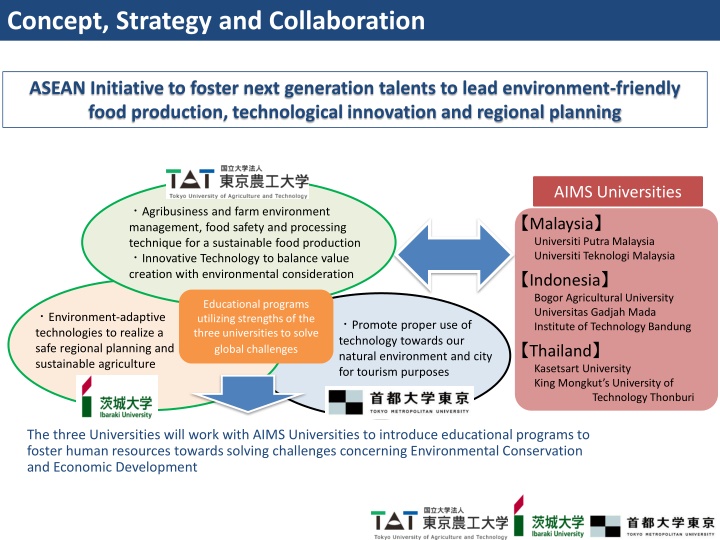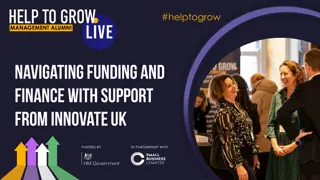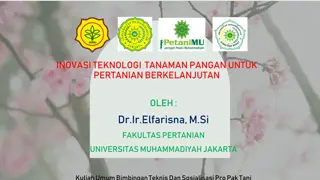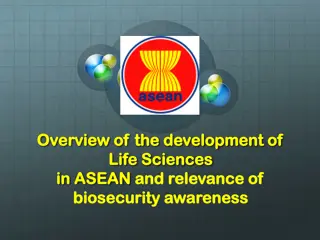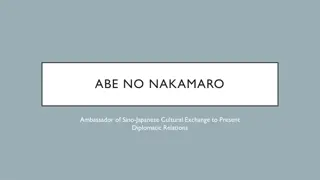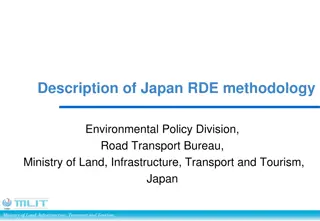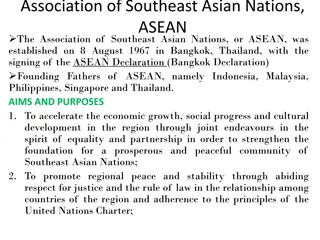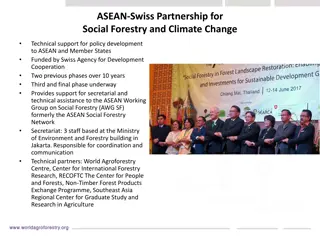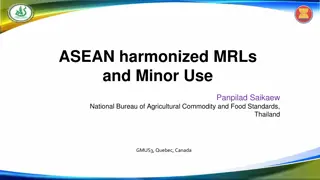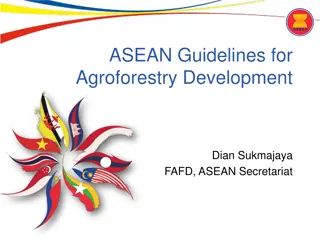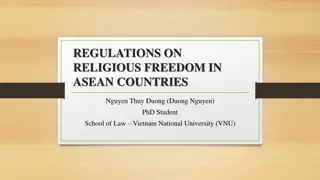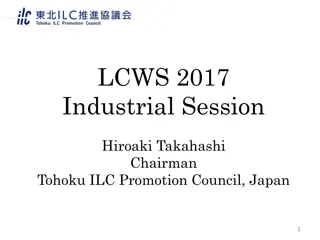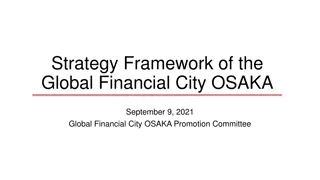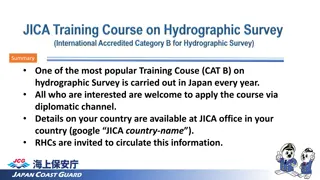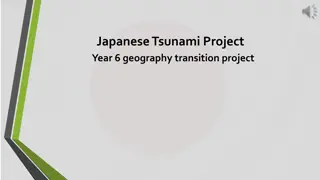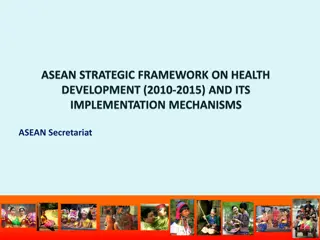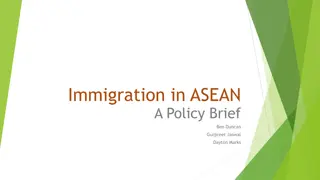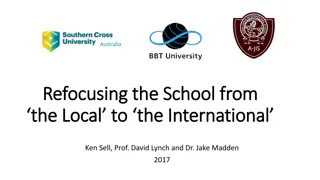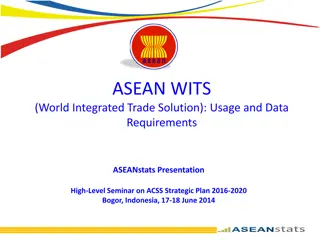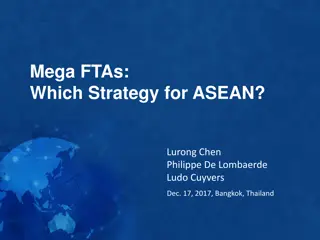ASEAN-Japan Collaboration for Sustainable Agriculture and Environmental Innovation
ASEAN and Japanese universities are collaborating to develop innovative solutions for sustainable agriculture, food production, and environmental conservation. The initiative aims to foster the next generation of leaders in environment-friendly technologies and regional planning. Through educational programs and research projects, the universities are addressing challenges facing the region, such as promoting sustainable practices and enhancing human resources for economic development.
Download Presentation

Please find below an Image/Link to download the presentation.
The content on the website is provided AS IS for your information and personal use only. It may not be sold, licensed, or shared on other websites without obtaining consent from the author.If you encounter any issues during the download, it is possible that the publisher has removed the file from their server.
You are allowed to download the files provided on this website for personal or commercial use, subject to the condition that they are used lawfully. All files are the property of their respective owners.
The content on the website is provided AS IS for your information and personal use only. It may not be sold, licensed, or shared on other websites without obtaining consent from the author.
E N D
Presentation Transcript
Concept, Strategy and Collaboration ASEAN Initiative to foster next generation talents to lead environment-friendly food production, technological innovation and regional planning AIMS Universities Agribusiness and farm environment management, food safety and processing technique for a sustainable food production Innovative Technology to balance value creation with environmental consideration Malaysia Universiti Putra Malaysia Universiti Teknologi Malaysia Indonesia Bogor Agricultural University Universitas Gadjah Mada Institute of Technology Bandung Thailand Kasetsart University King Mongkut s University of Technology Thonburi Educational programs utilizing strengths of the three universities to solve global challenges Environment-adaptive technologies to realize a safe regional planning and sustainable agriculture Promote proper use of technology towards our natural environment and city for tourism purposes The three Universities will work with AIMS Universities to introduce educational programs to foster human resources towards solving challenges concerning Environmental Conservation and Economic Development
Demand for Human Resources to Solve Challenges Facing ASEAN and Japan 1 Food Production Techniques that supports sustainable agriculture and higher added value Innovation bringing economic development with awareness to environment Sustainable regional systems for interactions between urban and rural regions TUAT IU TMU Student Exchange (SSSV AIMS for a semester Double Degree Joint Research Project Thailand Indonesia Malaysia [7 Universities, 4 Fields] Foster Human Resources with broad vision and the will to challenge by Specialized Education Programs that comes from Specialized Fields of the Three JPU (Agriculture, Engineering, Sustainability Science, Tourism)
Support for foreign students 2 Introduction of the Buddy System Network building through Buddy System Introduce the Buddy System for foreign students to support their life in Japan by studying together with partner Japanese students who will provide intensive support at classes and field works. Build alumni network through continuing support after their return to home countries. Solving ASEAN s challenges Program Coordinators Provide intensive support related to procedure for class registration, credit transfer and academic calendars. J A J J A A International Exchange Coordinators A A Provide wide support to facilitate their stay in Japan including English translation of various documents, plan/implementation of exchange programs with Japanese students, and consultation regarding residence. J J A J A J J A Global Caf and other exchange spaces Enhancement of exchange Opening and management of Global Caf and other international exchange spaces. Promotion of face book as a tool to enhance communication among Japanese and international students. Support by clerical staff Academic consultation prior to arrival in Japan Three JPU will employ English speaking staffs at key departments and intensify quality support through continued information exchanges and training. Provide academic consultation by TUAT s ASEAN Office as well as by guest professors at AIMS affiliated institutions prior to arrival in Japan. Provision of Accommodation Available accommodations including dormitories and rented share-houses.
Support for Japanese Students 3 Buddy System Pre-departure : outbound Japanese students will learn local language, custom, and culture from inbound Buddy students. At the host university : inbound Buddy students in Japan, will support Japanese students as a Buddy at his/her university. After returning : promote cross-cultural communication through planning/managing exchange and alumni events. Global Cafe and other exchange spaces Opening of Global Caf and other international exchange spaces to promote international communication. International Exchange Coordinators Provide support to brush up English conversation, pre-departure education on host country culture and custom, visa application. Pre-Training English: Intensive classes using outside language institutions targeted for students with TOEIC threshold score above 550. ASEAN topography: classes on ASEAN s natural environment, history culture, society and economy. ASEAN mobility workshop: classes about ASEAN challenges offered by visiting ASEAN professors. Support during studying abroad Provide consultation at TUAT s ASEAN Office as well as by guest professors at AIMS affiliated institutions on academic and daily matters. Consultation through Skype and international advisor/mentor with academic experience in Japan. Education after return to Japan Result reporting: Presentation on the outcome of studying abroad to be held at joint study camp at Ibaraki University Risk Management Establishment of 24-hour emergency contact system and information collection/provision through alliance with professional risk management company.
Curriculum 4 Tokyo Metropolitan University Tokyo University of Agriculture and Technology Ibaraki University Advanced Agro- Environmental and Food Technology Course Introduction to International Environmental and Agricultural Science, IT Literacy, Introduction to Sustainable Engineering, Introduction to Regional Disaster Prevention, Tourism in Japan Environment-friendly Technological Innovation Course Regional Sustainability Science Course Regional Planning Course Common Subjects 5 subjects/6 credits Food Production Technology related subjects Innovation Climate Change Adaptive Measures-related subjects Tourism-related subjects Fundamentals subjects Agricultural Environment and Production related subjects Environment and Material Cycle related subjects Social Economy related subjects Experiments and field practice Innovation Applied Technology subjects Sustainable Development Society related subjects Regional Environment related subjects Experiments Experiments Practical studies Specialized Subjects Internship Field studies Workshops Workshops Workshops Workshops 13 subjects/26 credits 13 subjects/26 credits 12 subjects/16 credits 14 subjects/22 credits Joint curriculum subjects 3 subjects /6 credits 2 subjects/4 credits 4 subjects/8 credits 2 subjects/4 credits Total 21 subjects/38 credits 20 subjects/36 credits 21 subjects/30 credits 21 subjects/32 credits
TUAT Faculty of Agriculture, Faculty of Engineering and Faculty of Bio- Applications and Systems Engineering (BASE) 400 Faculty members 4,300 Undergraduate students, 2,000 Graduate Students Fuchu campus (Faculty of Agriculture) Koganei campus (Faculty of Engineering, BASE) 6
Where are we from? Narita Shinjuku 30minutes Tokyo High Quality of Life 7
Spectrum of Globalization Foreign students to come! Japanese to study abroad! More Int l Collaboration More Int l Faculty fly! (Ph.D. or Post Dr.) jump! (Regular Programs: 2 years or more) step! (Short Term Exchange: 1 year) hop! (Short Stay: 2 weeks to 3 months) 10
